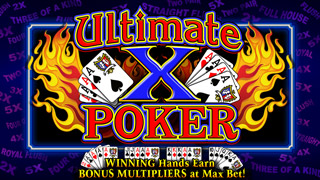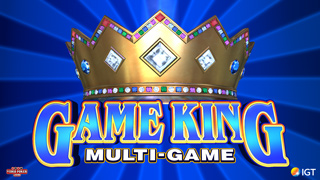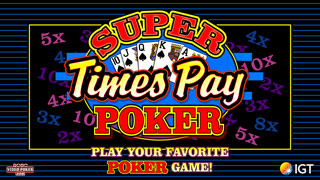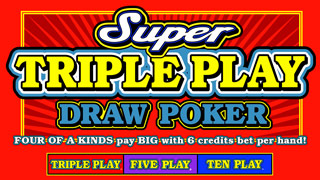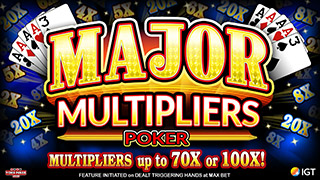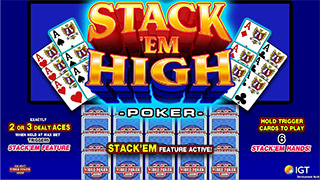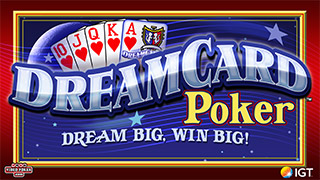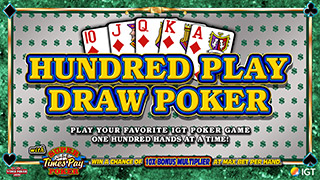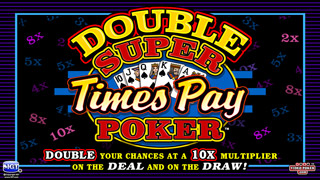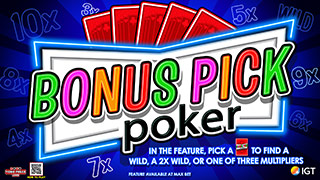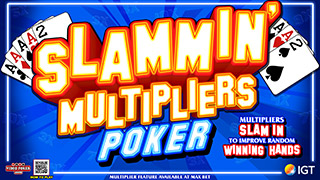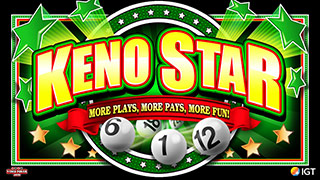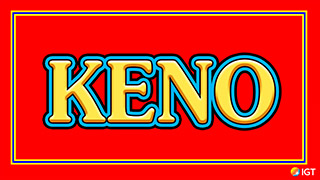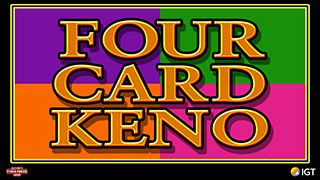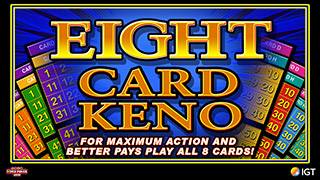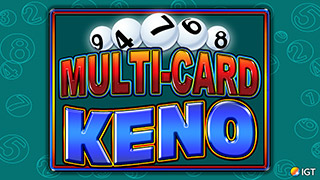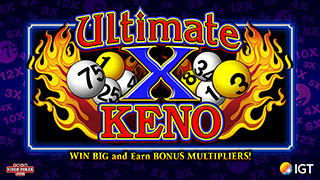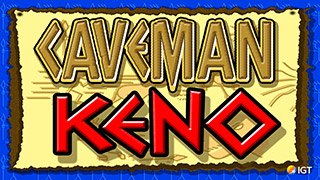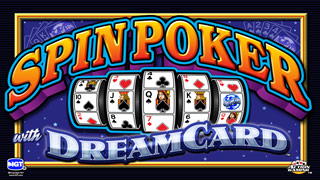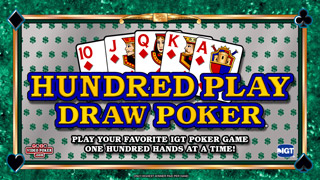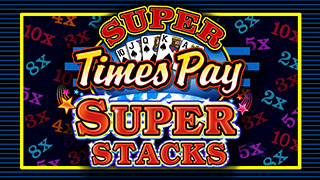Jackpot Frequency......
-
WisT
- Forum Rookie
- Posts: 24
- Joined: Mon Aug 02, 2010 1:45 am
Re: Jackpot Frequency......
This is a trick question. Imagine a thousand or a million line machine. The odds of being dealt an immediate RF are always 1/649,740. You would very likely see billions of hands before being dealt a RF. That is the nature of multi-line. It is a lesson in being accurate with words. We might say "hitting a RF" instead of "dealt" or "filling" or achieving a RF in a single deal. Yes, the average number of dealt RF's per hand is constant, but the actual frequency becomes more scarce per hand.
I think the experts mean to say "per hand on the average" but omit that because it is understood. If one plays 10x multi-line, then the frequency of a filled RF increases 10x even though the odds remain the same. Yes it is very odd.
tm
I think the experts mean to say "per hand on the average" but omit that because it is understood. If one plays 10x multi-line, then the frequency of a filled RF increases 10x even though the odds remain the same. Yes it is very odd.
tm
-
Frank Kneeland
- VP Veteran
- Posts: 762
- Joined: Wed Feb 02, 2011 6:59 pm
This is a trick question. Imagine a thousand or a million line machine. The odds of being dealt an immediate RF are always 1/649,740. You would very likely see billions of hands before being dealt a RF. That is the nature of multi-line. It is a lesson in being accurate with words. We might say "hitting a RF" instead of "dealt" or "filling" or achieving a RF in a single deal. Yes, the average number of dealt RF's per hand is constant, but the actual frequency becomes more scarce per hand.
I think the experts mean to say "per hand on the average" but omit that because it is understood. If one plays 10x multi-line, then the frequency of a filled RF increases 10x even though the odds remain the same. Yes it is very odd.
tm That's because you are thinking of the additional lines on a multi-line machine as separate hands. They are not. They are all one hand. Only the draws are separate.A draw without a deal is still considered one hand. Only the deal counts as a separate independent event. The draws are linked dependent events.Multi-line games do not increase the number of dealt hands one gets.Also when you finally do get a dealt Royal you'll get more of them, so the average remains 1/649,740.
-
jim18
- Senior Member
- Posts: 118
- Joined: Fri Mar 04, 2011 9:55 am
ShadowmanI can not say that I disagree that much with your point of view, or what you have written. I think that what is missing is an understanding of how a combination of two or more events, taken together, changes the odds of something occurring.For example, if a person were to flip a coin three times, each flip would be 50 % likely to be a head or tail. But, the likelihood that three heads will come up in a row is 1 out of 8. Yet, a person could argue that after the second flip of the coin, that the odds of getting a third head in a row are 1 out of 2.So, if a person hits a jackpot of any kind, such as RF or whatever, that person should be allowed to pause and say “what are the odds of getting two such jackpots back to back” Using your logic, I understand what your answer would be.However, if a person were to say “what are the chances of me getting two jackpots back to back,” then I think the answer is way different from what you are reporting it to be. Now, you are dealing with two independent events, taken in combination. This has to produce a different likelihood result, from just looking at the chances of the next event occurring.And I suspect, for this reason, so many players on this site, say that after a big hit, they move to another machine, for the believe that the likelihood to getting a large payout back to back ( or anytime soon) is immense.
-
Frank Kneeland
- VP Veteran
- Posts: 762
- Joined: Wed Feb 02, 2011 6:59 pm
ShadowmanI can not say that I disagree that much with your point of view, or what you have written. I think that what is missing is an understanding of how a combination of two or more events, taken together, changes the odds of something occurring.For example, if a person were to flip a coin three times, each flip would be 50 % likely to be a head or tail. But, the likelihood that three heads will come up in a row is 1 out of 8. Yet, a person could argue that after the second flip of the coin, that the odds of getting a third head in a row are 1 out of 2.So, if a person hits a jackpot of any kind, such as RF or whatever, that person should be allowed to pause and say “what are the odds of getting two such jackpots back to back” Using your logic, I understand what your answer would be.However, if a person were to say “what are the chances of me getting two jackpots back to back,” then I think the answer is way different from what you are reporting it to be. Now, you are dealing with two independent events, taken in combination. This has to produce a different likelihood result, from just looking at the chances of the next event occurring.And I suspect, for this reason, so many players on this site, say that after a big hit, they move to another machine, for the believe that the likelihood to getting a large payout back to back ( or anytime soon) is immense.
You are correct Jim, but it's all about perspective. The odds of getting two Jackpots in a row are greater than getting one in a row, if you set getting two as your goal before you have hit the first jackpot. Once you have hit the first jackpot your chances to hit the second one are the same as they were before you hit your first.You can't mix what has happened with what will happen any more than you can mix what should happen with what does happen.Probabilities are used to make decisions in advance of and irrespective of results.People always try to mix the two, but really they should be divided just like church and state.
-
shadowman
- Video Poker Master
- Posts: 3587
- Joined: Mon Oct 23, 2006 5:42 pm
Shadowman
I can not say that I disagree that much with your point of view, or what you have written. I think that what is missing is an understanding of how a combination of two or more events, taken together, changes the odds of something occurring.
One should only consider the combination of future events.
For example, if a person were to flip a coin three times, each flip would be 50 % likely to be a head or tail. But, the likelihood that three heads will come up in a row is 1 out of 8. Yet, a person could argue that after the second flip of the coin, that the odds of getting a third head in a row are 1 out of 2.
I don't think anyone with a knowledge of math would argue. The odds are "1 out of 2".
So, if a person hits a jackpot of any kind, such as RF or whatever, that person should be allowed to pause and say “what are the odds of getting two such jackpots back to back” Using your logic, I understand what your answer would be.
However, if a person were to say “what are the chances of me getting two jackpots back to back,” then I think the answer is way different from what you are reporting it to be. Now, you are dealing with two independent events, taken in combination. This has to produce a different likelihood result, from just looking at the chances of the next event occurring.
And I suspect, for this reason, so many players on this site, say that after a big hit, they move to another machine, for the believe that the likelihood to getting a large payout back to back ( or anytime soon) is immense.
You are still confusing the timing of events in your head. Frank answered your question with essentially the same thing I tried to tell you. You can only compute odds at a specific point in time. At that instant everything that happened in the past( including the last hand) is irrelevant. The odds of hitting a second big jackpot is exactly the same if you stay on a machine or move to another machine.
I can not say that I disagree that much with your point of view, or what you have written. I think that what is missing is an understanding of how a combination of two or more events, taken together, changes the odds of something occurring.
One should only consider the combination of future events.
For example, if a person were to flip a coin three times, each flip would be 50 % likely to be a head or tail. But, the likelihood that three heads will come up in a row is 1 out of 8. Yet, a person could argue that after the second flip of the coin, that the odds of getting a third head in a row are 1 out of 2.
I don't think anyone with a knowledge of math would argue. The odds are "1 out of 2".
So, if a person hits a jackpot of any kind, such as RF or whatever, that person should be allowed to pause and say “what are the odds of getting two such jackpots back to back” Using your logic, I understand what your answer would be.
However, if a person were to say “what are the chances of me getting two jackpots back to back,” then I think the answer is way different from what you are reporting it to be. Now, you are dealing with two independent events, taken in combination. This has to produce a different likelihood result, from just looking at the chances of the next event occurring.
And I suspect, for this reason, so many players on this site, say that after a big hit, they move to another machine, for the believe that the likelihood to getting a large payout back to back ( or anytime soon) is immense.
You are still confusing the timing of events in your head. Frank answered your question with essentially the same thing I tried to tell you. You can only compute odds at a specific point in time. At that instant everything that happened in the past( including the last hand) is irrelevant. The odds of hitting a second big jackpot is exactly the same if you stay on a machine or move to another machine.
-
jim18
- Senior Member
- Posts: 118
- Joined: Fri Mar 04, 2011 9:55 am
As I stated before, I agree that the odds of hitting a RF are 1/40,000. And if the RF appeared on the last hand, then the odds of hitting a RF on the next hand are 1/40,000. But this is only true when you consider each hand as an independent event.When a VP poster posted on this site that he hit a jackpot, and when paid, told the attendant to stand by, due to the chances of him hitting back to back jackpots, he was not considering two independent events. In that person’s mind it seems to be somewhat likely that he can hit back to back jackpots.So, to put this matter to rest, how about one of you experts stating what is the likelihood of a player hitting back to back jackpots. Once you give out the odds of this occurring as being in the millions, then I think players can see the wisdom of not having any expectation of hitting back to back jackpots. And from that decide if they want to move to another machine, or stay the course.I suspect that the odds of hitting back to back RF is north o f 1 in 16,000,000.
-
Frank Kneeland
- VP Veteran
- Posts: 762
- Joined: Wed Feb 02, 2011 6:59 pm
I have seen back to back Royals hit twice during my 23 years as a professional VP player. Once was by one of players. Another time was just a women sitting behind me. I have also seen simultaneous Royals hit on a bank of progressive machines several times. Once it was to our teams favour, the other two times we got the reset RF amount and the enemy team got the big JP.The chances are roughly 1 in 32,000 to get back to back RF and much easier for simultaneous progressive RFs because each machine on the bank is eligible. Play strategy on progressives also shortens the RF cycle.Let's assume non-progressives. 1/40,000This is to say for every 40,000 Royals hit out there 1 of them will be back to back. Not that hard.The probability you are listing is the chances of hitting two Royals in a row on your next two hands. That's not even close to the same thing as asking, "what are the chances that the next two Royals I hit will be back to back?". Since with this phrasing of the question the next one can occur on "any" hand in the future the probably of that RF is discarded. We call this "the drug dealer phenomenon."Basic Rule of Probability = First One's Free~FKP.S. @Jim please keep asking questions if you need any help with probability related things. This question is obviously not important, but other ones might be. The way you are looking at probability could lead to bad decision making. That's what these forums are for to spread around good information and help people make better decisions. This is a really productive thread.
-
backsider
- VP Veteran
- Posts: 578
- Joined: Sun May 08, 2011 11:35 pm
[QUOTE=jim18]ShadowmanI can not say that I disagree that much with your point of view, or what you have written. I think that what is missing is an understanding of how a combination of two or more events, taken together, changes the odds of something occurring.
One should only consider the combination of future events.For example, if a person were to flip a coin three times, each flip would be 50 % likely to be a head or tail. But, the likelihood that three heads will come up in a row is 1 out of 8. Yet, a person could argue that after the second flip of the coin, that the odds of getting a third head in a row are 1 out of 2.
I don't think anyone with a knowledge of math would argue. The odds are "1 out of 2".So, if a person hits a jackpot of any kind, such as RF or whatever, that person should be allowed to pause and say “what are the odds of getting two such jackpots back to back” Using your logic, I understand what your answer would be.However, if a person were to say “what are the chances of me getting two jackpots back to back,” then I think the answer is way different from what you are reporting it to be. Now, you are dealing with two independent events, taken in combination. This has to produce a different likelihood result, from just looking at the chances of the next event occurring.And I suspect, for this reason, so many players on this site, say that after a big hit, they move to another machine, for the believe that the likelihood to getting a large payout back to back ( or anytime soon) is immense.
You are still confusing the timing of events in your head. Frank answered your question with essentially the same thing I tried to tell you. You can only compute odds at a specific point in time. At that instant everything that happened in the past( including the last hand) is irrelevant. The odds of hitting a second big jackpot is exactly the same if you stay on a machine or move to another machine.[/QUOTE]
Surfing through here today was a joy until seeing shadowman become short-fuse frustrated again by someone who is only trying to understand. Thank god we have Frank and his clear thinking, kind responses.
-
farc
- Forum Regular
- Posts: 89
- Joined: Wed Jan 26, 2011 7:33 pm
What about this? Understanding that we are talking averages of 1/40000, does the machine have to cycle through an average of 40,000 hands or do I have to play about 40,000 hands?Theoretically. Is it about the machine or me as a player over time?
-
Frank Kneeland
- VP Veteran
- Posts: 762
- Joined: Wed Feb 02, 2011 6:59 pm
What about this? Understanding that we are talking averages of 1/40000, does the machine have to cycle through an average of 40,000 hands or do I have to play about 40,000 hands?Theoretically. Is it about the machine or me as a player over time?The answer is both and neither. Looking at averages is a form of sampling (taking a part of a lager whole). It is both the machine and you and any other combination of sampled hands. One could look at:1. Hands played on a particular machine.2. Hands played only by yourself on any machine.3. Only the odd numbered hands played by you.4. The hands played in a particular casino by everyone.5. Hands played when 80's disco music was on the intercom.6. Only the even numbered hands you have played on every second Tuesday.7. Hands played by people with pink underwear.8. Etc...No matter how you sample it, the answer will always roughly be between 32,000 & 46,000 hands to each Royal Flush depending on the game and the strategy...and given a large enough sample.You asked, " does the machine have to cycle through an average of 40,000 hands?"The simple answer is, "no" because machines do not "cycle through" anything. The process of generating random hands has no beginning, or end, or middle. "cycle" is a mathimatical term used to denote the average number of hands required to get a particular probability.On a six sided die, the cycle of hitting a six would be 6 tosses. If you role a die to test this it is unlikely that you will role the die six times and get a six on exactly your sixth role.



